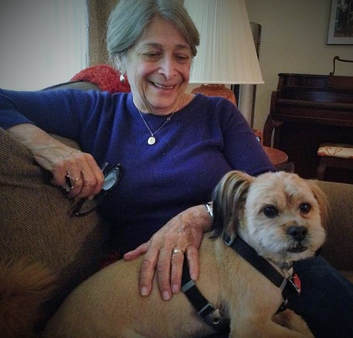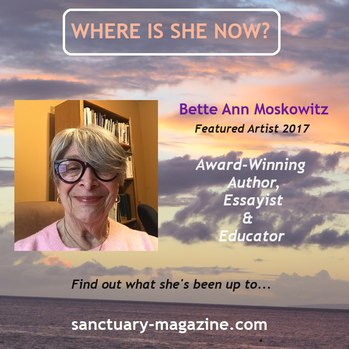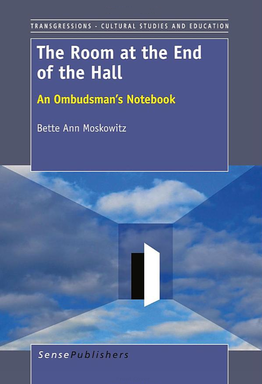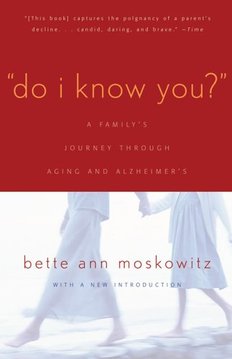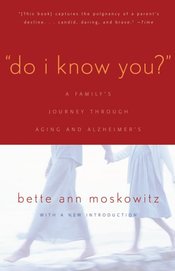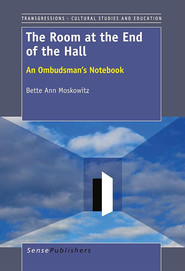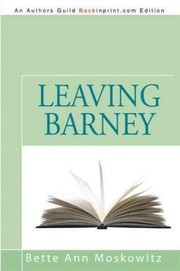November 2017: Featured Artist
Award-Winning Author & Teacher
Bette Ann Moskowitz
~~~
|
Bette Ann Moskowitz is an award-winning author and teacher who was born in Bronx, NY. She developed a love of reading from a young age and wrote her first book – a mystery - in a school notebook at the age of nine. Bette received her undergraduate degree from Hunter College and her graduate degree in writing from Queens College. She has an eclectic resume, having written publicity for Decca Records, songs that garnered modest royalties, plays (one of which was granted an audition for Broadway), stand-up comic routines, op-eds and articles for The New York Times and several books, both fiction and non-fiction. Her memoir Do I Know You? A Family’s Journey through Aging and Alzheimer’s won a New York State Foundation for the Arts Fellowship for Literary Non-fiction and The Room at the End of the Hall: An Ombudsman’s Notebook was a Finalist in the New York State Foundation for the Arts Fellowships for Literary Non-fiction. Bette has just finished a new novel, Three Legs in the Evening, about a woman in her sixties who reinvents herself, embraces a newfound sensuality and finds love again after a terrorist attack rocks her personal and external world.
|
Bette taught writing for years at Queens College and is a winner of the President’s Award for Excellence in Teaching. In 2000, she and her husband relocated to Woodstock, NY. She continues to teach writing workshops for various adult learning programs, and, of course, she is always writing.
|
Update: November 2023: Since Bette's feature, she has been writing prolifically. Most recently, she has had a successful book reading and book signing for her latest novel, Three Legs In The Evening (Roundfire Press), and the publisher has proposed her work for a major fiction prize in the UK.
Her short story, "Seeds," was named winner of the 2023 Thornwillow Patron's Prize, in association with the New York Foundation for the Arts. The prize celebrates the work of new voices by presenting them in Thornwillow's beautiful limited edition chapbook and making sure that key figures in the creative world get to see the work. In addition to an excerpt of Three Legs in the Evening, Bette's books Reading the Signs and Finishing Up were excerpted in Sanctuary as well as her essay, "Notes in the Doctor's Office: Part I." |
Myrna Beth Haskell, managing editor, interviewed Bette at her home in Woodstock. After being enthusiastically greeted by her precious dog, Pete, Myrna and Bette sat down in her comfortable living room to chat about her books, her time as a volunteer, long-term care ombudsman, her views about aging and her latest pursuits.
Our theme for November is “Aging Gracefully.” What are your thoughts on this?
Bette laughs. More than anything it’s a matter of luck. If luck goes bad, you’re screwed. You know what? You better make friends with your face. My mother bleached my hair from the time I was a child. I didn’t even know what color my hair was. At some point, I said goodbye to the dye job. Thankfully, I have great natural gray. I’ve had women ask me where I get it done. She laughs again. Lucky me, I guess.
Honestly, it’s important to own your age. There are certain things you’re never going to do, and then there are some things you should still try. I decided a while back that I was going to go to this yoga place. I asked the woman teaching the classes, ‘Can I still do real people yoga, or do I have to do old people yoga?’ I asked Bette how the woman responded. ‘Ha! She said I could do the real people yoga!’
Regarding The Room at the End of the Hall: I’ve spent time in nursing homes and have witnessed how some residents are blessed with frequent visits, while others seem to have no one. It’s heartbreaking. What are some ways you were able to help those who needed it the most?
Our theme for November is “Aging Gracefully.” What are your thoughts on this?
Bette laughs. More than anything it’s a matter of luck. If luck goes bad, you’re screwed. You know what? You better make friends with your face. My mother bleached my hair from the time I was a child. I didn’t even know what color my hair was. At some point, I said goodbye to the dye job. Thankfully, I have great natural gray. I’ve had women ask me where I get it done. She laughs again. Lucky me, I guess.
Honestly, it’s important to own your age. There are certain things you’re never going to do, and then there are some things you should still try. I decided a while back that I was going to go to this yoga place. I asked the woman teaching the classes, ‘Can I still do real people yoga, or do I have to do old people yoga?’ I asked Bette how the woman responded. ‘Ha! She said I could do the real people yoga!’
Regarding The Room at the End of the Hall: I’ve spent time in nursing homes and have witnessed how some residents are blessed with frequent visits, while others seem to have no one. It’s heartbreaking. What are some ways you were able to help those who needed it the most?
|
I wanted to talk about what goes on. When you walk through those halls…Bette hesitates as if she’s remembering something extremely unpleasant. There’s a desensitization that goes on in these places, and it’s hard to witness…maybe even hard to not fall into it.
Anyway, in some odd way it fulfilled my lifelong rebel personality. I always wanted to stamp my feet about something. I wanted to advocate for people who couldn’t advocate for themselves. Even for those who have family members involved…the family members are afraid that if they speak up, their loved ones will be retaliated against. I was there to see that their needs were being met and to speak to the right person if they weren’t. We need to de-medicalize aging. We’re always talking about an elderly person’s shortcomings – what’s wrong with them, their ailments - instead of staying positive. The most important thing, though: If there’s any way you can keep them home, keep them home! |
Click book cover for excerpt
|
What did you learn about how our culture perceives and relates to the elderly?
This is a culture that’s all about youth and success. Older people are treated badly. They’re marginalized. They’re no longer the centers of their families. You know, everything is so politically correct these days. You can’t make a joke about anything anymore. But you can make jokes about old people. We even joke about ourselves! Old people are very self-deprecating.
Once, I was teaching a workshop at a college and asked the students to write down the first thing they thought of when they imagine a senior citizen. You wouldn’t believe the descriptors: smelly, crippled, mean, ill…the list goes on. The only students who had more positive things to say were the ones who had good experiences with grandparents that they had developed relationships with because they lived close by.
What was one memorable experience from your time as a volunteer ombudsman that really resonated with you?
There is one experience that really sticks with me.
Bette began telling me about an eye witness she needed to interview concerning “minor” complaints that she was investigating. This witness lived in the “room at the end of the hall.”
I spotted this gentleman sitting tall in his wheelchair. It was odd because it was a beautiful day out, but the window was closed. He invited me to sit down. This is when I noticed the man’s belt was undone and his underwear was showing. I introduced myself, and I also made it clear that I wasn’t asking him to rat on anyone. He was very hesitant. He told me that he didn’t want to get anyone in trouble and that he was new there. But he was willing to confirm the complainant’s story. He then started apologizing about his pants, telling me he hadn’t been feeling well. He told me his children thought he’d be safer not being alone in the house after his wife had died. He suddenly started to cry thinking of her, and then he was apologizing for crying. He pointed to a picture of his family. I brought it over, and he pointed to each person in the photo, naming each one. This seemed to open him up a bit because then he mentioned that he couldn’t open his window because the facility smoking area was out there and the smoke was coming in through the window. He told me how much he loved the fresh air, but he had complained once, and no one did anything. He then reiterated that he didn’t want to alienate anyone. I asked if I could complain on his behalf. I would say that I noticed the window was closed on such a nice spring day. He agreed.
It really got to me. This man was so kind and so gentle. I just couldn’t stop thinking about how his life had so abruptly changed – how he had been stripped of his comfort and his dignity, but he remained respectful and concerned about others.
Bette writes, “That day, I began to think about leaving this job which had hijacked my life for almost a decade, and which I felt I could do forever. I knew that I had to leave so I could write the story of what I had seen, and felt, and learned.
This is a culture that’s all about youth and success. Older people are treated badly. They’re marginalized. They’re no longer the centers of their families. You know, everything is so politically correct these days. You can’t make a joke about anything anymore. But you can make jokes about old people. We even joke about ourselves! Old people are very self-deprecating.
Once, I was teaching a workshop at a college and asked the students to write down the first thing they thought of when they imagine a senior citizen. You wouldn’t believe the descriptors: smelly, crippled, mean, ill…the list goes on. The only students who had more positive things to say were the ones who had good experiences with grandparents that they had developed relationships with because they lived close by.
What was one memorable experience from your time as a volunteer ombudsman that really resonated with you?
There is one experience that really sticks with me.
Bette began telling me about an eye witness she needed to interview concerning “minor” complaints that she was investigating. This witness lived in the “room at the end of the hall.”
I spotted this gentleman sitting tall in his wheelchair. It was odd because it was a beautiful day out, but the window was closed. He invited me to sit down. This is when I noticed the man’s belt was undone and his underwear was showing. I introduced myself, and I also made it clear that I wasn’t asking him to rat on anyone. He was very hesitant. He told me that he didn’t want to get anyone in trouble and that he was new there. But he was willing to confirm the complainant’s story. He then started apologizing about his pants, telling me he hadn’t been feeling well. He told me his children thought he’d be safer not being alone in the house after his wife had died. He suddenly started to cry thinking of her, and then he was apologizing for crying. He pointed to a picture of his family. I brought it over, and he pointed to each person in the photo, naming each one. This seemed to open him up a bit because then he mentioned that he couldn’t open his window because the facility smoking area was out there and the smoke was coming in through the window. He told me how much he loved the fresh air, but he had complained once, and no one did anything. He then reiterated that he didn’t want to alienate anyone. I asked if I could complain on his behalf. I would say that I noticed the window was closed on such a nice spring day. He agreed.
It really got to me. This man was so kind and so gentle. I just couldn’t stop thinking about how his life had so abruptly changed – how he had been stripped of his comfort and his dignity, but he remained respectful and concerned about others.
Bette writes, “That day, I began to think about leaving this job which had hijacked my life for almost a decade, and which I felt I could do forever. I knew that I had to leave so I could write the story of what I had seen, and felt, and learned.
|
In your memoir Do I Know You? you write, “Deciding mother doesn’t know best anymore is upside down, disloyal and frightening as hell.” Tell me what it was like to write this memoir about your mom’s decline. Was it cathartic in any way? I get asked that a lot. I kind of resist that it was cathartic, though. This may surprise some, but I don’t think of writing as therapy. I know many writers do, but not me. I had been searching for a book about it. All the books were about how to find an appropriate nursing home or what to do about financial concerns, etc. I wanted to read about the emotional stuff. So, I decided to send a questionnaire out to everyone I knew who was going through it, too. This directed me on the structure of the book, and I began writing what I could not find. |
Click book cover to learn more from Bette's website
|
You use humor in this book, and humor is thread throughout other works as well. Did humor help you get through some of the most difficult parts of your journey?
Well…what do you have if you don’t have humor? A sense of humor gets you through the tough stuff. But it’s not like it would be comfortable to say to someone, ‘You’re getting older, so you better get a sense of humor!' Listen…if you laugh at least once a day, it’s a beautiful thing. And I think the reader needs a bit of humor, too, don’t you think?
Having gone through this yourself, is there a piece of advice you’d like to share with our readers who are caring for a loved one with advanced senility or Alzheimer’s?
My cousin’s daughter called me and asked if I’d take the time to call her mother. Her mother had been having some memory issues. So, I called my cousin. She sounded thrilled to hear from me, but then she would get confused and ask who was calling again. Or…she would repeat herself after already having told me a story. When I asked about what her oldest grandchild was doing, she couldn’t tell me. We had a lovely conversation, though. It didn’t matter that she’d lose track a bit. We laughed and laughed. We were just two cousins talking. There was no shame, and I just went with the flow.
So, I guess what I want to say is to go with the flow. Don’t waste your energy on denying what’s happening. Put your energy toward seeing what’s possible and focusing on the good stuff.
Tell me a bit about your new book Three Legs in the Evening.
I’ve just finished it. The title is a reference to the Riddle of the Sphinx.* I loved, loved writing this one! I’m in love with the main character. She is a great woman – very feisty! She is a widow in her sixties who is reinventing herself in the shadow of a terrorist attack that turns her world upside down, both inside and out. She is also exploring a newfound sensuality. I’m shopping this around and will let you know when it’s published.
*Note: Greek mythology – story of Oedipus and the Sphinx: The Sphinx who ruled Thebes and protected its borders asked those who wanted to enter her kingdom to answer a riddle. If they didn’t answer correctly, she ate them. When Oedipus arrived, she asked, “What creature walks on four legs in the morning, two legs at noon and three in the evening?” Oedipus answered, “A human because he crawls as a baby, walks as a man, and in old age he walks with the aid of a cane.”
Where are you teaching now?
I teach writing workshops for various adult learning programs, such as Lifespring in Saugerties, NY and the Lifetime Learning Institute which has several venues in the area. I’ve taught a workshop called ‘Writing Three Ways’ which explores memoir, non-fiction essay and poetry.
And you will continue to write?
Myrna…I’ll be writing forever!!
Well…what do you have if you don’t have humor? A sense of humor gets you through the tough stuff. But it’s not like it would be comfortable to say to someone, ‘You’re getting older, so you better get a sense of humor!' Listen…if you laugh at least once a day, it’s a beautiful thing. And I think the reader needs a bit of humor, too, don’t you think?
Having gone through this yourself, is there a piece of advice you’d like to share with our readers who are caring for a loved one with advanced senility or Alzheimer’s?
My cousin’s daughter called me and asked if I’d take the time to call her mother. Her mother had been having some memory issues. So, I called my cousin. She sounded thrilled to hear from me, but then she would get confused and ask who was calling again. Or…she would repeat herself after already having told me a story. When I asked about what her oldest grandchild was doing, she couldn’t tell me. We had a lovely conversation, though. It didn’t matter that she’d lose track a bit. We laughed and laughed. We were just two cousins talking. There was no shame, and I just went with the flow.
So, I guess what I want to say is to go with the flow. Don’t waste your energy on denying what’s happening. Put your energy toward seeing what’s possible and focusing on the good stuff.
Tell me a bit about your new book Three Legs in the Evening.
I’ve just finished it. The title is a reference to the Riddle of the Sphinx.* I loved, loved writing this one! I’m in love with the main character. She is a great woman – very feisty! She is a widow in her sixties who is reinventing herself in the shadow of a terrorist attack that turns her world upside down, both inside and out. She is also exploring a newfound sensuality. I’m shopping this around and will let you know when it’s published.
*Note: Greek mythology – story of Oedipus and the Sphinx: The Sphinx who ruled Thebes and protected its borders asked those who wanted to enter her kingdom to answer a riddle. If they didn’t answer correctly, she ate them. When Oedipus arrived, she asked, “What creature walks on four legs in the morning, two legs at noon and three in the evening?” Oedipus answered, “A human because he crawls as a baby, walks as a man, and in old age he walks with the aid of a cane.”
Where are you teaching now?
I teach writing workshops for various adult learning programs, such as Lifespring in Saugerties, NY and the Lifetime Learning Institute which has several venues in the area. I’ve taught a workshop called ‘Writing Three Ways’ which explores memoir, non-fiction essay and poetry.
And you will continue to write?
Myrna…I’ll be writing forever!!
Click on book covers to purchase Bette's books:

